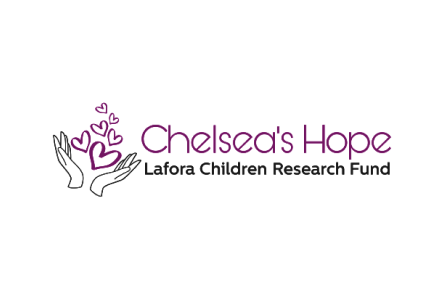Chelsea's Hope Lafora Children Research Fund
Cycle 2
Patient-Partnered Collaboration
Lafora disease is the most severe form of human epilepsy. It is an inherited myoclonus epilepsy syndrome. Although a child is born with Lafora, they may grow up normally with no perceivable problems until they begin to suffer with seizures during adolescence.
Last updated 04/30/2025
Clinical
Disease Class
Genetic diseases
Inherited metabolic disorder
Neurological diseases
Body Systems
Metabolic
Muscular / Skeletal
Nervous / Sensory
Respiratory
Organs
Brain
Heart
Muscles
Known Genetic Link
Yes, one or more genes directly cause the condition
causative_genes
EPM2A
NHLRC1
contributory_genes
None specified / unknown
Type of Inheritance
Autosomal recessive
Newborn Screening
No
Disease Mechanism(s)
Glutamate pathway malfunction
Glycogen pathway dysregulation
Glycogen storage disease
Glycosylation disorder
Inherited metabolic disorder
Age of Onset
Adolescence (12-17)
Middle childhood (6-11)
Average Age at Diagnosis
Adolescence (12-17)
Life Expectancy
Adolescence (12-17)
Adulthood (age 18-64)
Affected Sex(es)
Female
Male
National Prevalence
11-50
Global Prevalence
1001-10000
National Incidence
Less than 10
Global Incidence
Less than 10
Populations and/or ancestry with higher prevalence
Mediterranean Region: Italy, Spain, Greece, Turkey; Middle East: Arabian Peninsula; Pakistan & India
Symptoms / Phenotypes
behavioral changes
cognitive decline
cognitive impairment / confusion / brain fog
dementia
depression
dysarthria
movement disorders / ataxia / tremor
respiratory insufficiency / respiratory failure
seizures / epilepsy
Biomarkers
Diagnostic
· glycogen levels
Monitoring
· Glycogen Levels, Glutamine Levels
Existing Therapies
Expanded access (Compassionate Use)
Off-Label Drug Use
Organizational & Research
Cell Lines
Fibroblasts
iPSCs
Cell Lines, Institution
Instituto de Biomedicina de Valencia
Jackson Laboratories (JAX)
University of California San Diego (UCSD)
University of Florida
University of Texas Southwestern Medical Center (UTSW)
Cell Lines, Involvement
Consulted
Cell Lines, share
Some of our cell lines are freely available
Disease Model
Dog
Mouse
Disease Model, Involvement
Consulted
Disease Model, share
Some of our disease models are freely available
Clinical Trial Role
Data analysis
Data sharing
Focus group
Funding
Outcome measures, development
Recruitment and outreach, patients
Recruitment and outreach, trial sites/physicians
Travel coordination
Biobank, Institution
None
Center of Excellence, Institution
None
Registry
Yes, we have collaborated on a registry
Data Collected, Registry
Electronic health records/electronic medical records
Genetic data
Longitudinal natural history data
Medication usage
Patient contact info
Patient-reported data
Data Entered by, Registry
Both
Platform, Registry
Other
Natural History Study
Yes, we have collaborated on a natural history study
Data Collected, Natural History Study
Clinical endpoints (outcomes)
Imaging data
Platform, Natural History Study
REDCap
FDA Patient Listening Session
We have taken formal steps to schedule a meeting
FDA Patient-Focused Drug Development (PFDD) Program
No
ICD Codes
Yes, we have an ICD-10 code specific to our exact disease
Diagnostic Guidelines
Yes, we have guidance available on our website
Science Advisory Board Policies
Yes, willing to share SAB policies
Research Network Policies
Has CRN but no policies
Research Roadmap
We don't have a Research Roadmap
International Chapters
None
International Partners
Europe
South America
